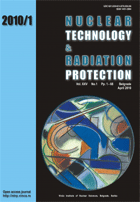
INFLUENCE OF TUBE VOLUME ON MEASUREMENT UNCERAINTY OF GM COUNTERS
Pages: 46-50
Authors: Koviljka Dj. Stanković, Miloš Lj. Vujisić, Ljubinko D. Delić
Abstract
GM counters are often used in radiation detection since they generate a strong signal which can be easily detected. The working principal of a GM counter is based on the interaction of ionizing radiation with the atoms and molecules of the gas present in the counter’s tube. Free electrons created as a result of this interaction became initial electrons, i. e. start an avalanche process which is detected as a pulse of current. This current pulse is independent of the energy imparted on the gas, that being the main difference between a GM counter and the majority of other radiation detectors. In literature, the dependence on the incidence of radiation energy, tube’s orientation and characteristics of the reading system are quoted as the main sources of measurement uncertainty of GM counters. The aim of this paper is to determine the dependence of measurement uncertainty of a GM counter on the volume of its counter’s tube. The dependence of the pulse current on the size of the counter’s tube has, therefore, been considered here, both in radial and parallel geometry. The initiation and expansion of the current pulse have been examined by means of elementary processes of electrical discharge such as the Markov processes, while the changes in the counter’s tube volume were put to test by the space – time enlargement law. The random variable known as the “current pulse in the counter’s tube” (i. e. electrical breakdown of the electrode configuration) has also been taken into account and an appropriate theoretical distribution statistically determined. Thus obtained theoretical results were then compared to corresponding experimental results established in controlled laboratory conditions.
Key words: GM counter, enlargement law, measurement uncertainty
FULL PAPER IN PDF FORMAT (558 KB)
Last updated on September, 2010
